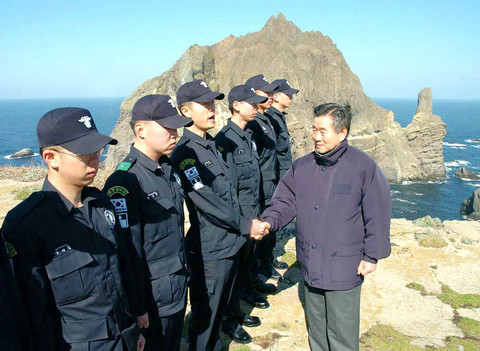South Korea's police chief flew to a group of rocky islets yesterday in a symbolic trip stressing the country's control of the barely inhabitable outcroppings, while the Seoul government tried to stem a brewing territorial dispute with Japan from engulfing another island.
Hur Joon-young was South Korea's first police chief to visit the cluster of islets, called Dokdo in Korea and Takeshima in Japan, since South Korea regained control of them at the end of the Korean Peninsula's liberation from Japanese colonial rule in 1945.
Hur, who traveled to the islets by helicopter, urged a contingent of South Korean policemen based there to "be proud of protecting part of our national territory and keep up with their vigilance," reported South Korea's Yonhap news agency.

PHOTO: AP
The volcanic outcroppings, roughly halfway between South Korea and Japan and surrounded by rich fishing grounds, became a focal point of South Koreans' rekindled ill feelings toward their former colonial rulers this month when the Japanese ambassador called them "historically and legally" part of Japanese territory. Tempers spiked further this week when a local Japanese assembly voted to designate a special day to commemorate Tokyo's claim to the islets.
In a tit-for-tat measure, South Korea's Masan City outraged many Japanese on Friday by passing a resolution commemorating Korean claims to Japan's Tsushima Island, off South Korea's southeastern tip, which Koreans say was once controlled by ancient Korean kingdoms.
The comparable actions by local agencies in the two nations have yet to be endorsed by their respective central governments.
The South Korean Foreign Ministry yesterday criticized Masan City.
"The ministry fully understands Masan citizens' loyal patriotism but the measure does not help the government's efforts to defend its sovereignty over Dokdo and could trigger unnecessary disputes," ministry spokesman Lee Kyu-hyung said in a statement. "We should take a practical and cool-headed approach in defending Dokdo."
The statement appeared to reflect South Korea's efforts to curb overflowing emotions. Last week, a mother and son cut their fingers in a show of anger. A man set himself on fire during a protest this week.
While Japan warned traveling citizens to avoid protests in Seoul, T-shirts bearing the picture of the islets are gaining popularity among South Koreans. A mobile phone company took out ads reminding people that its signals are caught in the far-flung islets. Youngsters play electronic games featuring Koreans depending Dokdo from invaders.

Indonesia yesterday began enforcing its newly ratified penal code, replacing a Dutch-era criminal law that had governed the country for more than 80 years and marking a major shift in its legal landscape. Since proclaiming independence in 1945, the Southeast Asian country had continued to operate under a colonial framework widely criticized as outdated and misaligned with Indonesia’s social values. Efforts to revise the code stalled for decades as lawmakers debated how to balance human rights, religious norms and local traditions in the world’s most populous Muslim-majority nation. The 345-page Indonesian Penal Code, known as the KUHP, was passed in 2022. It

US President Donald Trump on Friday said Washington was “locked and loaded” to respond if Iran killed protesters, prompting Tehran to warn that intervention would destabilize the region. Protesters and security forces on Thursday clashed in several Iranian cities, with six people reported killed, the first deaths since the unrest escalated. Shopkeepers in Tehran on Sunday last week went on strike over high prices and economic stagnation, actions that have since spread into a protest movement that has swept into other parts of the country. If Iran “violently kills peaceful protesters, which is their custom, the United States of America will come to

‘DISRESPECTFUL’: Katie Miller, the wife of Trump’s most influential adviser, drew ire by posting an image of Greenland in the colors of the US flag, captioning it ‘SOON’ US President Donald Trump on Sunday doubled down on his claim that Greenland should become part of the US, despite calls by the Danish prime minister to stop “threatening” the territory. Washington’s military intervention in Venezuela has reignited fears for Greenland, which Trump has repeatedly said he wants to annex, given its strategic location in the arctic. While aboard Air Force One en route to Washington, Trump reiterated the goal. “We need Greenland from the standpoint of national security, and Denmark is not going to be able to do it,” he said in response to a reporter’s question. “We’ll worry about Greenland in

Auschwitz survivor Eva Schloss, the stepsister of teenage diarist Anne Frank and a tireless educator about the horrors of the Holocaust, has died. She was 96. The Anne Frank Trust UK, of which Schloss was honorary president, said she died on Saturday in London, where she lived. Britain’s King Charles III said he was “privileged and proud” to have known Schloss, who cofounded the charitable trust to help young people challenge prejudice. “The horrors that she endured as a young woman are impossible to comprehend and yet she devoted the rest of her life to overcoming hatred and prejudice, promoting kindness, courage, understanding